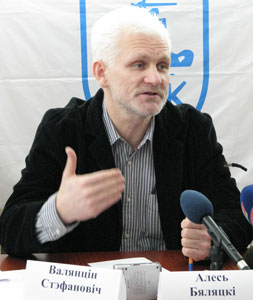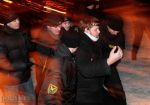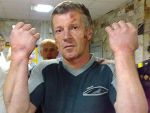Ales Bialiatski: ‘The practice of torture, violence, false evidence fabricated by police officers is part of daily life’
Mass detentions and arrests of representatives of the unrecognized Union of Poles, a nervous attitude of the police to the work of journalists, trials and allegations of disorderly conduct against civil and political activists – all this has its specific reasons, which the authorities try to cover up with demagogic statements on rights and freedoms. These are the reasons named by the vice-president of the International Federation of Human Rights, Chairman of the Human Rights Center Viasna Ales Bialiatski in an interview with our correspondent.
Mr Ales! Recent developments of social and political life in Belarus and the authorities’ reaction to them, have concerned many citizens and, of course, first of all human rights defenders. Can any trends be viewed over the cruel actions of the Belarusian police, or are these just random events?
A.B.: Unfortunately, the pessimistic predictions of human rights defenders, sounded at the end of last year, are really coming true. Two months ago I said that there was a high probability of deterioration in the relationship between the civil society and the Belarusian authorities, mainly due to two large national campaigns, due in 2010: one of which – the local councils elections, the other - the presidential election, preparations for which will begin later this year.
As shown by previous experience of ‘preparations’ of the authorities to such companies - the steps are accompanied by large-scale repressions against active citizens in different directions. It is evident that there is a specific plan, according to which the strong pressure of the State is once again used against NGOs, independent trade unions and the media.
Earlier this year, we noted dispersals of a number of peaceful rallies held by the youth: February 14, Valentine's Day and Solidarity Day on February 16. We can see pressure put on the Union of Poles in Belarus, the persecution of which, by the way, started long before the previous presidential election in 2005, when the Union of Poles was artificially split into two organizations. Since then, unrecognized by the authorities, the Union of Poles, which unites the most active and independent representatives of the Polish minority, is trying to assert its members’ rights, their dignity and the part of assets that remains after them. Another manifestation of the harassment was the recent scandal surrounding the Polish House in Ivianets, which was forcibly seized by the police and demonstrated quite a hostile attitude of the Belarusian authorities to the unrecognized organization.
It is also necessary to note the active and consistent practice of non-registration of non-governmental organizations and political parties, which the government firmly adhered to in 2009. At the beginning of 2010 a final refusal of registration by the Supreme Court was received by the Belarusian Christian Democracy, the Justice Ministry issued a similar decision against the Assembly of Non-governmental Organizations and the entrepreneurs’ trade union ‘Razam’.
We have repeatedly registered the unprecedented pressure on the press and independent journalists who are trying to cover public events or actions occurring in Belarus.
One cannot ignore the desire of the authorities to prevent the holding of peaceful demonstrations and other events. In addition to the dispersed rallies in Minsk, one can mention the recent arrests of representatives of the Polish minority in Hrodna - Vice-Chairman of the Union of Poles, the press secretary and board member of the organization, the large fine awarded to chairperson of the unrecognized government of the Union of Poles Anzelika Borys for holding a peaceful rally, which took place in Hrodna is the result of the harassment of the organization’s activists.
Corr.: But why are the authorities so severe towards a plain non-governmental organization, using inappropriate methods of persecution of its members? What kind of danger can the state see in the unrecognized Union of Poles?
A.B.: With regard to the threat posed by the Polish national minority for the country - I do not know what secret plots the KGB has, it looks like they are always looking for some danger, but they really need to remember that we live in a very different time of the calendar – the XXI century. Today, any sensible and rational government creates favorable conditions for national minorities, for these are the same citizens like everyone else, they pay the same taxes, they have the right to cultural and national development, to education in their native language, they are a pledge of good relations with their native country. And what we see in Belarus is quite the opposite. There is not only suppression of Belarusian language education (each year, the number of pupils in Belarusian schools is steadily and rapidly declining), but it also concerns the learning of the Polish language in public schools, let alone Ukrainian and other languages of the national minorities in Belarus.
For example, last year in Hrodna region, in many schools the Polish language was transferred from the compulsory subjects curriculum to optional training, which drastically reduced the number of children who attend such classes. This we believe is wrong. Firstly, the Polish language learning in the adjacent region of Poland would be useful for all, not only for children of Polish families. Obviously, this is potentially conducive to economic competitiveness in the entire Hrodna region. Secondly, the state should not in the slightest way put pressure on the minority, on the contrary, according to all international agreements signed by Belarus, it should help them.
But, unfortunately, we do not have the concept of the state relations between the government and national minorities. There is a stiff Committee on Religions and Nationalities at the Council of Ministers, headed by Comrade Huliaka with his Soviet methods and approaches, whose main task, as it seems, is ‘not to let go!’ Well, clearly, there is the KGB, which is always trying to add its ‘two fingers’ in any public initiative and, I believe, too, was involved in the division of the Union of Poles in Belarus. That is all what the national policy is about.
The russification of Belarusians, Poles, Jews and others has been under way in Belarus for more than 200 years. And the current authorities are as stiff in the national question as the former imperial and Soviet regimes.
Corr.: Let us return to the issue of ‘the fingers’... the announcement of the verdict in the case of the Vitsebsk activist Aleh Surhan, who received 6 months in jail and a heavy fine on charges of disorderly conduct, namely, that he had allegedly bit the finger of a policeman. Is it political persecution?
A.B.: In fact, the situation in Vitsebsk is quite tense and it all started at the beginning of the year, after Siarhei Kavalenka hoisted a national white-red-white flag on a festive Christmas tree. After this event, local intelligence and law enforcement agencies went mad: began an endless campaign of detentions of civil activists, initiated legal proceedings against Aleh Surhan, instituted back in 2009 and then suspended. This is quite a dirty case with regard to the conduct of representatives of Vitsebsk law enforcement agencies. Let us not forget that Surhan was detained and severely beaten for hanging the national flag, he was hung by the handcuffs and beaten with the use of torture and violence. And the allegations that he while being taken to the police department, with handcuffs behind his back, lying on the floor of a police bus, smashed his head against the door and bit the finger of a policeman is totally unconvincing. The counter-claim was filed by the police only after Surhan registered the injuries and complained to the prosecutor against the police officers. Then they began to move, to hush up the abuse and torture they themselves had done, and filed a counterclaim.
I must say that it is very similar to the case of another Vitsebsk resident Parsiukevich, who had also allegedly assaulted a policeman in the Minsk detention center at Akrestsin Str., and was thus severely beaten.
We are convinced that there is visible motive of the authorities to bring down the activity of representatives of the democratic community of Vitsebsk with trials and arrests, to try to intimidate people who have the right to express their opinion. And the fact that the national flag is banned in this way, with people being prosecuted under civil or in the same manner under criminal proceedings, it's just a shame today for the Belarusian authorities.
Corr.: Does this prosecution demonstrate that Aleh Surhan suffered because of his civil stance and we can speak of another political prisoner in Belarus?
A.B.: I am personally convinced that Surhan did not get his term for hooliganism, but for politics, whatever the police could invent. He was arrested for a white-red-white flag and a desire to write it off on hooliganism, the resistance to the police - it's all unfounded and has a certain bitter tragicomic aftertaste. I remember the story by Chekhov, where in the middle of the city a dog bit the goldsmith Khriukin’s finger, which provoked a great scandal.
The means currently used by the police against civil activists are indecent. There are even attempts to charge journalists with ‘disorderly conduct’, who perform their professional duty. Recently, we heard direct threats toward the UCPB leader Anatol Liabedzka, who was arrested in Valozhyn and warned that he could also be prosecuted. These facts are an unattractive picture. Human rights activists do not agree with such tactics by the security forces aimed at pinning dirty labels on civil activists who simply strive for their civil and political rights, using legal and peaceful means.
Corr.: Mr. Ales! Representatives of Belarusian human rights organizations sent letters to the Interior Ministry, the KGB and other security agencies inviting them to participate in negotiations on the issues of freedom of assembly and maintaining law and order during peaceful assemblies. What do you want to achieve by these negotiations?
A.B.: Indeed, representatives of various human rights organizations had a meeting and offered the Ministry of the Interior, the KGB, Minsk city police authorities and the deputies, who are supposed to be in charge for these issues, to meet at the talks. I liked this very idea: not a ‘round table’, which usually comes to nothing, not a demand, but negotiations.
We would like to present the claims we have today to the representatives of law enforcement agencies. We can see that the practice of torture, violence, false evidence fabricated by police officers against civil and political activists in Belarus is part of daily life.
I am convinced that this is not a local initiative by sergeants or warrant officers - they are properly instructed and guided. After we collect complaints from people who were beaten by riot police during arrests and rallies, we send them to the prosecutor’s office, and the prosecutor actually covers these crimes.
In such a situation, the Ministry of Internal Affairs and the intelligence services must think about what they do and stop criminalizing law enforcement officers, who almost legally engage in such dirty business as beatings, violence and torture of citizens, civil society activists. Meanwhile, people are sometimes simply framed, as in the cases of Surhan and Liabedzka.
In this case, it must be noted that the Belarusian police turned from a body, which must maintain order, protect the rights and freedoms of citizens, to a punitive agency, aiming at protection of lawlessness and permissiveness, a body which brazenly violates the laws and the Constitution of Belarus.
This meeting, unfortunately, did not take place, none of the invitees turned up, they did not even sent, figuratively speaking, a sergeant with a rubber truncheon. They are either afraid or ashamed, I do not know.
Nevertheless, human rights defenders have prepared a formal appeal to a number of representatives of the power ministries with the proposal to meet on specific topics at any time convenient to them. On the other hand, we are certainly going to attract the maximum attention of the international community to the problems, because today's situation runs counter to the country’s signed international treaties and agreements, both within the UN and the OSCE structures, and the new program of the EU and Belarus, the Eastern Partnership.






















